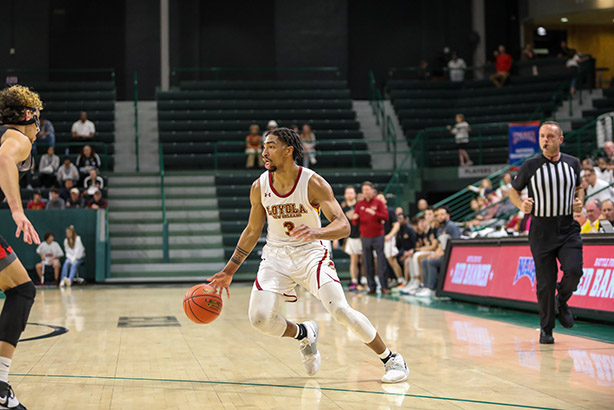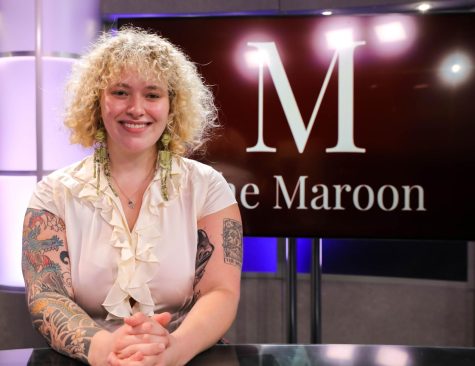Former Loyola athlete opens up about mental health struggles
Myles Burns dribbles the ball against Benedictine University at Mesa at Devlin Fieldhouse on March 11, 2022. Burns ranks second in school history in points and rebounds.
April 30, 2023
Myles Burns, a part of the team at Loyola that won the National Association of Intercollegiate Athletics Men’s Basketball Championship last year and named MVP of the National Tournament his senior year here at Loyola, used his last year of eligibility at the University of Mississippi for the 2022-2023 season.
“The coaching and the environment, it’s a much bigger stage against much different competition,” he said. “Bigger, stronger guys [who are] more athletic from all positions.”
Myles expressed how hard it was to go into a new environment with so many different new factors after being at Loyola for four years. He had to have more mental solitude which took hard work and discipline to push past the new challenges he was faced with, he said.
One of the challenges was dealing with a larger social media presence.
“If you sneeze wrong in the game, or, you know, have the game you aren’t supposed to have, people are going to criticize you for it, and there is no way of avoiding it,” Burns said. “You kind of just have to be mentally sound.”
Looking back, Burns said he experienced a lot of people criticizing him at Loyola, but at Ole Miss, he received “twice, three times, maybe four times as many people doing that on a totally different level.”
“If you win or lose a game, people sometimes will send you death threats,” he said. “Or people place their bets, and you got all these betting pages tagging you on social media. And you can’t respond, obviously, because you can get in trouble or get suspended or possibly lose your scholarship.”
Burns said that he was not in a good mental space because he wasn’t used to all the backlash from social media and that athletes are not as open to posting their mental health struggles on social media as much. According to a survey conducted by the National Collegiate Athletic Association in 2020, the data showed rates of mental exhaustion, anxiety, and depression in student-athletes have remained one and a half to two times higher than identified before the COVID-19 pandemic.
Burns said he is not sure if he has totally recovered from his mental health issues but is progressing and feels it made him stronger. He pointed out how important it is to be able to express emotions or feelings toward a situation in a productive manner. His method is stopping players from arguing all the time because everyone will continue to be in a bad mental space, looking over their shoulders for when the next fight is going to happen.
“It’s okay to not like each other, but I think there is a way to have a healthy relationship even if you don’t agree with each other’s perspective on things,” he said.
The mental health of student-athletes has been an ongoing issue in college athletics. Toward the end of the season this year, Burns said he would turn his phone off to help himself recover. He expressed how the public does not often realize how physically and mentally taxing it can be as a student-athlete. But he said he believed that the right tools were out there to address his issues.
“I just didn’t utilize them because I didn’t grow up that way,” Burns said.
69% of female athletes and 63% of male athletes either agreed or strongly agreed that the participants knew where to go for their mental concerns on campus, according to the NCAA survey.
“Everybody, depending on how they were raised, has this wall that they put in front of them and has an opening to where they can make something happen, but they just are not comfortable with doing that,” Burns said.
Transferring to Ole Miss, Burns said he felt that he did not have the same connections with people as he did at Loyola, and he was not comfortable opening up about his emotions and the adversity he faced.
“I felt like if I had a whole day where I could go talk to my therapist, I probably would have done it, but I don’t know,” he said.
In the NCAA survey, the participants responding to the mental health support questions showed less than half of the athletes agreed or strongly agreed with the statement that they felt comfortable enough to seek support.
Moving to this new environment pushed Burns out of his comfort zone to adjust to different personalities and build his leadership skills more, but he said that the process of becoming a leader in the setting at Ole Miss has been difficult for him.
Burns said that coming in, he was viewed as the underdog and in a position where he wasn’t viewed as a leader because most people he encountered had no prior knowledge of the NAIA level of basketball. He had to prove that his resume spoke for itself and translated on the court.
“I have always been at a disadvantage, even coming from Loyola and winning a national championship,” Burns said. “People were ignorant to this level of play, so they don’t really know how good the competition is.”
However, Burns said he used his story to his advantage and emphasized that if the right people listen to the story, then everything will work out the way it needs to be.
“My story is showing that I and my game can translate from any level no matter how big the jump,” he said.
Burns felt that playing at Ole Miss gave him more recognition and a bigger platform. Whether people came to see his team or their opponent, they were able to watch him do what he does best at a higher level, he said.
“I ended up being the shock of the league that all the coaches were talking about,” he said. “They were super surprised that I ended up being the type of player that I was and ended up being one of the top players in the conference.”
While this journey for Burns has been something he never expected, he knew that the challenges wouldn’t stop him from achieving at the highest level and reaching his goals.
“I am going to declare for the draft soon. I am about to sign with an agent,” he said.








